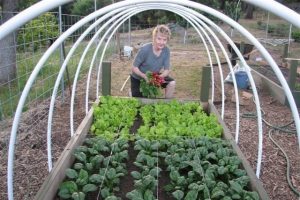There are many well-researched benefits to gardening: fresh air, frequent exercise resulting in stronger bones and muscles, appreciation of nature—the opportunity to enjoy that proverbial robin on the wing, the scent of roses or freshly turned soil. The list goes on and on.
However, recently, a long-time Tuolumne County master gardener made the comment that, “A sustainable garden is one where you can garden when you’re 80 years old!” Or, as former master gardener Lori Littleton asked, “When did working in the garden start to become more work than pleasure? That milestone birthday…did that have an effect on my stamina and ability to garden and work in the yard with ease and pleasure?”
It’s time we put the idea of “disabilities” aside. If we live long enough, every one of us will face mobility/ability issues. And, even the young and strong sustain injuries. Recently, a concept called universal design has made its way through gardening education circles. Originating in the 1960s and 70s, universal design is defined by one of its founders, wheelchair-bound architect Ron Mace, as, “The design of products and environments to be useable by all people.”
A Google search for “universal design gardening” brings up many links. One of my favorites is from Oregon State University entitled “Gardening Can Be Accessible to All with Some Adjustments. It comes with an associated publication “Gardens Are for Everyone”.
So, here are some sustainable gardening tips from master gardeners near and far. If you aren’t accustomed to yard work, start out slowly and work up to more vigorous activities. Look for tools that fit you such as ergonomic handles on rakes and shovels. Left-handed tools or those that can be used with either hand are available.
Protect from the sun’s ultraviolet (UV) light with a hat with a wide brim, a good slathering of sunscreen and lip balm with an SPF factor of at least 15. Both prescription and nonprescription sunglasses should be labeled to block at least 60 percent UVA and 95 percent UVB. Remember the sun is especially strong at our higher altitudes and during the middle of the day. And, UV light comes through haze and clouds too. Provide places in the garden to rest in the shade. Have water close by to sip.
All adults need a tetanus (lockjaw) booster shot every 10 years since tetanus bacteria are present worldwide and commonly found in soil, dust, and manure. Yes, the bacteria can make its way through a deep wound or even a small skin prick, but prevention is as easy as routine immunization and booster shots—for gardeners and non-gardeners alike!
Dean Fosdick (late Associated Press reporter and master gardener who wrote bi-monthly AP gardening columns) recommended some of the following practices. Build raised beds narrow and small—easy to reach and less heavy potting soil to lift. Mulch liberally to keep weeds from getting started.
Reduced vision gardening can be done with the help of aromatic markers. Choose flowers and herbs with bright colors and distinctive scents. Make pathways wide and smooth for power chairs, wheelchairs or walkers. Add handrails, benches and pullouts to comfortably enjoy the fruits of your gardening labor.
Grow vertically to avoid stooping. Choose vining vegetables and flowers like pole beans and tomatoes, morning glories and clematis. Use a kneeler or sit on an upside-down bucket to protect knees.
For more tips and tricks, check out the many research-based university extension (Ohio State, UCANR, Oregon State) pages on-line. And, no matter your age, be safe and garden for enjoyment and sustainability into a healthy old age.
This article is a compilation of information from former University of California Cooperative Extension master gardeners Vera Strader and Lori Littleton of Tuolumne County, edited by Rebecca Miller-Cripps. We gratefully acknowledge information from Oregon State University Extension, Ohio State University Extension and University of California Agriculture and Natural Resources.

